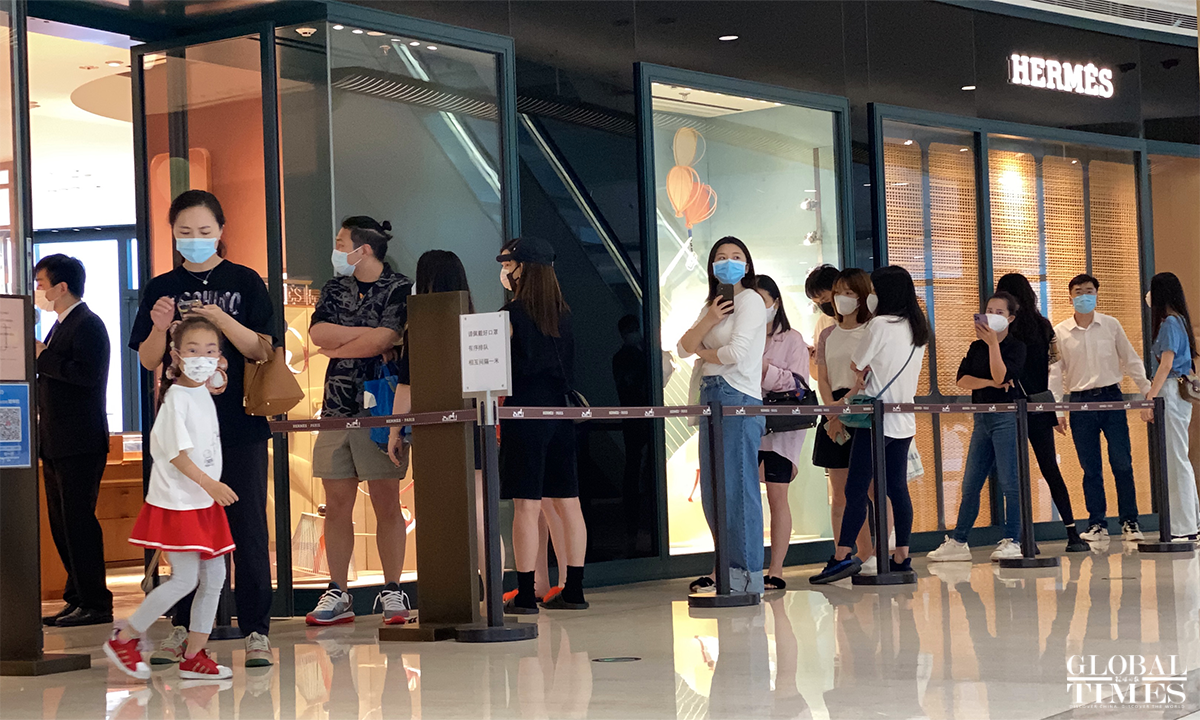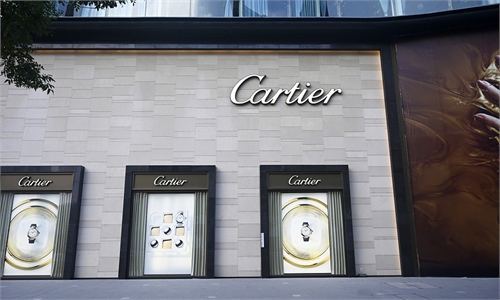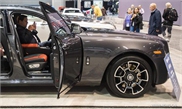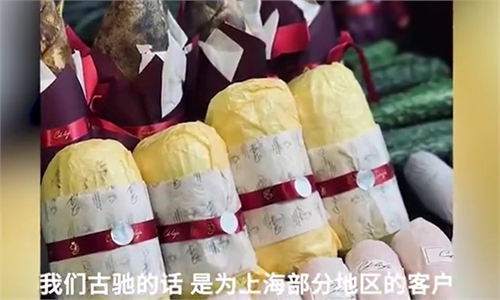Chinese urban consumers splurge on luxury goods, as economic recovery speeds up
Record sales in major cities reflect rapid consumption recovery

The Plaza 66 shopping mall on Nanjing road in Shanghai resumed business on June 1. The flow of people has increased and there are long queues in front of some luxury stores. Photo: Chen Xia/GT
Luxury stores in major Chinese cities have seen a surging number of customers and record sales both online and offline, buoyed by a consumption comeback for high-end fashion and accessories after the latest wave of domestic COVID-19 resurgences was brought under firm control and an economic recovery picks up pace.
Analysts and businesses are confident and optimistic about the recovery of China's domestic consumption of luxury products, as purchasing power is still strong, and they expect a quick return to growth in China, which is set to become the world's biggest luxury market by 2025.
The rebound in luxury goods sales is also in line with an expected recovery in the broader consumer market, a pillar of the Chinese economy that has been badly hit by the recent virus outbreaks.
During the lunch break on Wednesday, long lines were seen in front of some luxury stores in Plaza 66, a mall in Shanghai, as people waited to choose luxury products.
A sales representative of Italian jewelry brand BVLGARI told the Global Times on Wednesday that the impact of COVID-19 on its business was short-lived.
"We've seen a quick rebound of consumption after Shanghai lifted the lockdown. Over the past weekend, a lot of people visited our store. In general, we are still optimistic about the consumption power of the Chinese market," the person said.
The Plaza 66 shopping mall fully resumed business on June 1 as Shanghai announced an end to its two-month COVID-19 lockdown. Stimulated by shoppers' enthusiasm and triple loyalty points offered by the mall, stores such as Hermes, Louis Vuitton and Dior each recorded sales of more than 1 million yuan ($149,000) on the first day of reopening, according to media reports.
Meanwhile, two salespeople from Gucci and Cartier stores in Beijing told the Global Times that a lot of customers came in after the stores reopened to the public. Both said that there were few items in stock, and customers may need to make reservations to buy certain items.
Some customers have chosen to shop online. This year, more than 200 luxury brands are participating in the annual 618 shopping event on Alibaba's Tmall, including LVMH Group, Kering Group and Richemont Group, and more than 20,000 new products will make their debuts, according to a statement Tmall sent to the Global Times.
Italian fashion brand Max Mara, which participated in the 618 event for the first time, saw transactions exceed 1 million yuan in just 2 minutes after the launch of the event, while Prada saw triple-digit growth from the same period last year.
Domestic consumption power for high-end products in China is leading the world, while many customers have purchased luxury products in China as a substitute for traveling and shopping overseas due to the COVID-19 outbreaks, Zhang Yi, CEO of iiMedia Research Institute, told the Global times on Wednesday.
Although sales of luxury products were affected during flare-ups as consumers were not able to make purchases in person, sales have fully recovered in major cities such as Shenzhen and Guangzhou in South China's Guangdong Province. Sales in Shanghai and Beijing are gradually rebounding, Zhang noted.
Sales of personal luxury goods in the Chinese mainland notched up a 36 percent year-on-year increase to $74 billion in 2021, almost double that of 2019, according to the Xinhua News Agency.
In 2021, about 21 percent of global consumer spending on luxury goods came from the Chinese mainland, and China is expected to become the world's largest luxury market by 2025, according to the global management consulting firm Bain & Co.
Many luxury brands have revisited their strategies for the Chinese market, and upgraded their services.
Gucci's new China head is expected to strengthen local teams, giving them control of marketing and advertising, Reuters reported on Tuesday. Cartier recently renovated its outlet in Yuanyang Taikooli in Chengdu, Southwest China's Sichuan Province, with touches of Chinese culture.
On Tmall, more than 30 luxury brands, including Gucci, Saint Laurent and Prada, have launched the "luxury gift customization" service, allowing consumers to engrave their products and make personalized gift cards.



